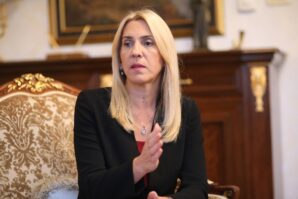
The Agency for Medicines and Medical Devices of Bosnia and Herzegovina (ALMBiH) checked the quality of vaccines against Covid-19: Sputnik V and Astra Zeneca vaccines and determined that the tested samples of these vaccines correspond to the declared quality in terms of tested parameters.
Considering the above, the conditions have been met for the mentioned vaccines to be used in the process of immunization of the population, the Agency for Medicines and Medical Devices of BiH announced.
At the same time, the Agency for Medicines and Medical Devices of BiH today approved the import of the vaccine manufactured by Astra Zeneca (Covid-19 Vaccine AZ / SKBio), which is provided for Bosnia and Herzegovina through the COVAX mechanism.
A year has passed since the first case, a year of getting used to the “new normal state”. What did the year that changed our lives look like?
“I am here to inform the public that we have the first reported case of coronavirus in Republika Srpska (RS). He is a middle-aged person, a man who works in Italy and who returned from there at the end of last month. He lives here in Banja Luka, ” RS Minister of Health and Social Welfare, Alen Seranic, told a year ago.
A few days later, the first case of infection was registered in the Federation of Bosnia and Herzegovina (FBiH). It was confirmed officially on March 9th in Zenica-Doboj Canton. As epidemiologists explained, a “new normal state” followed for BiH citizens. Distance two meters. Face masks. Already forgotten gloves. Distance learning. Work from home. Business suspension. Curfew. Limited travel.
“We are following all measures determined by the World Health Organization (WHO). Therefore, all measures that are being implemented in the world are being implemented here as well, ” pointed out Goran Cerkez, Assistant Minister of Health of FBiH.
The pandemic became weaken during the summer months, but the total number of infected people in BiH until today has exceeded 130 thousand. More than five thousand citizens of different ages died as a result of the infection. Those who, due to the coronavirus, asked for medical help for the first time in their lives also ended up on respirators. One of them is 32-year-old Nikola Vukcevic from Banja Luka, the father of a 10-month-old baby. He spent two months in the hospital. There were days when doctors predicted him only a two percent chance to live.
“I don’t remember those few days very well. I know it was worsened. But I was motivated by the desire to watch my daughter grow up. A lot of things came to my mind, but I tried to cut off such thoughts, ” Nikola told.
The doctors, while fighting for the lives of their patients, also ended up on respirators, which they called see-saws between life and death during the pandemic. Some did not survive, but their colleagues did not give up the fight.
“At some point, you identify with those people. Especially if it doesn’t go in the direction it should. You put in maximum effort and work, but the disease progresses and it does not end well. This is perhaps the worst thing that can happen to a healthcare worker, ” said Doc. Dr. Sasa Dragic from the Clinic of Invasive Medicine for non-surgical branches of the University Clinical Center of RS.
While we encouraged the health workers with applause from our balconies, some of the politicians ended up in the judicial authorities due to suspicious procurements of medical equipment. We also witnessed the corona parties, which were led by government officials and other public figures, but without any consequences. Their example was later followed by reckless citizens.
In parallel with the fight against the deadly virus, there is also a fight for the mental health of the people whose lives have been changed by the pandemic. Worldwide, research has begun on the possibility of immunization against a new deadly virus. Our doctors as well have started taking blood plasma from recovered patients as a potential help to difficult patients.
Although the first vaccines for emergency use were approved in the world at the end of December and the diplomatic fight for their purchase began, our authorities cannot yet brag with the results. RS independently bought Russian Sputnik vaccines for one part of the health workers, and the other part was vaccinated in Serbia. Serbia also donated 5.000 AstraZeneca vaccines to the Federation. In both entities, citizens are still waiting for vaccination.


















